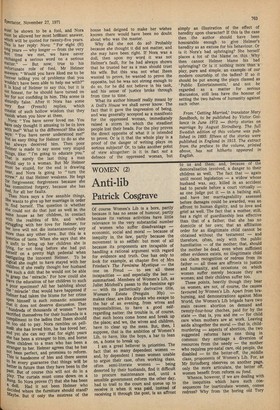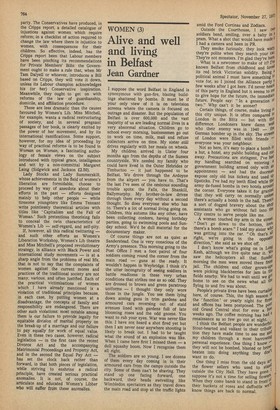WOMEN (2)
Anti-lib
Patrick Cosgrave
Of course Women's Lib is a bore, partly because it has no sense of humour, partly because its various activities have little relevance to the very substantial number of women who suffer disadvantage — economic, social and moral — because of inequity in, the law, partly because the movement is so selfish: but most of all because its proponents are incapable of handling a rational argument with regard for evidence and truth. One has only to look for example, at chapter five of Mrs Friedan's The Feminine Mystique — the one on Freud — to see all these incapacities — and especially the last — summarised. Members of Women's Lib, as Juliet Mitchell's paean to the feminine ego — with its pathetically derivative title, Woman's Estate (Penguin 30p) — makes clear, are like drunks who escape to the bar of an evening, from wives and responsibilities, to have a good selfregarding natter: the trouble is, of course, that such boors come home and break up the place; and we, the wives and children, have to clear up the mess. But, then, I suppose, that is the ambition of Women's Lib, to have, like the boys, a bar to lean on, a home to break up.
I am a great believer in priorities. The fact that so many dependent women — and, by dependent I mean women unable to argue their case, often working class, often semi-literate women — being deserted by their 'husbands, find it difficult to procure maintenance and, until a sensible government reform the other day, had to trail to the court and queue up to receive it when it was paid, instead of receiving it through the post, is an affront
to us and them: and, because of the demoralisation involved, a danger to their children as well. The fact that — again until recent legislation — a widow whose husband was, say, killed in an accident had to parade before a court virtually — as one judge put it — in a bathing suit, and have her marriageability assessed before damages could be awarded, was an affront to human dignity, and to love and grief as well. The fact that a mother, still, has a right of guardianship less effective than that of a father; that she has no domicile of her own; that an affiliation order for an illegitimate child cannot be obtained without the testament — and therefore, often, only with the public humiliation — of the mother; that, should the mother be dead, even when sufficient other evidence exists, no illegitimate child can claim recognition or redress from its father — all these are affronts to justice and humanity, and occasions on which women suffer merely because they are women; and their children suffer too.
These points, heavily though they bear on women, are not, of course, the causes favoured by Women's Lib. Apart from braburning, and demonstrations against Miss World, the Women's Lib brigade have two main causes: abortion on demand and twenty-four-hour cheches, paid for by the state — that is, you and me — for child care when mothers are at work. Leaving aside altogether the moral — that is, childmurdering — aspects of abortion, the two suggested reforms have one thing in common: they envisage a diversion of resources from the needy — the mother who requires pre-natal care, old people, the disabled — to the better-off, the ,middle class, proponents of Women's Lib. For, as Mr Strindberg observes on another page, only the more articulate, the better off, women benefit from reform au fond.
Whence, however, if we are dealing with the inequities which have such consequences for inarticulate women, comes redress? Why from the boring old Tory party. The Conservatives have produced, in the Cripps report, a detailed catalogue of injustices against women which require reform; in a checklist of action required to change the law where there is injustice to women, with consequences for their children. So effective, indeed, has the Cripps report been that Labour members have been pinching its recommendations for Private Members' Bills: the Government ought to make a rule that, when Mr Tam Dalyell or whoever, introduces a Bill based on Cripps, they will vote it down, unless its Labour champion acknowledges his (or her) Conservative inspiration. Meanwhile, they ought to get on with reforms of the law of guardianship, domicile, and affiliation procedure.
These are less dramatic than the causes favoured by Women's Lib. Miss Mitchell, for example, wants a radical restructuring of society, and in several pregnant passages of her book, is clearly excited by the power of her movement, and by its international ramifications. Some support, however, for my idea of proceeding by way of practical reforms is to be found in Woman on Woman, a fascinating authology of female views on the subject introduced with typical grace, intelligence and wit by a non-committal Margaret Laing (Sidgwick and Jackson E2.50).
Lady Stocks and Lady Summerskill, whose achievements in the field of women's liberation are formidable, choose to proceed by way of anecdote about their efforts in the past — efforts designed mainly to help other people — while tiresome youngsters like Emma Tennant write pointlessly theoretical articles with titles like ' Capitalism and the Fall of Woman.' Such pretentious theorising fails to conceal the twin characteristics of Women's Lib — self-regard, and self-pity.
If, however, all this radical twittering — and such other efforts as Women's Liberation Workshop, Women's Lib theatre and Miss Mitchell's proposed revolutionary strategy, in alliance with Black Power and international study movements — is at a sharp angle from the problems of real life, that is not to say that the complaints of women against the current mores and practices of the traditional society are not many, various, and often justified. Each of the practical victimisations of women which I have already mentioned is a violation of traditional principles because, in each case, by putting women at a disadvantage, the concepts of family and responsibility are endangered. There are other such violations: most notable among them is our failure to provide legally for equitable division of marital property on the break-up of a marriage and our failure to pay equally for work of equal value. Even in these two cases, however, radical legislation — in the first case the recent Divorce Act and the accompanying Matrimonial Proceedings and Property Act, and in the second the Equal Pay Act — has set the clock back rather than forward, in that both pieces of legislation, while striving to enshrine a radical principle, have created serious practical anomalies. It is not, •of course, the articulate and educated Women's Libber who will suffer from these anomalies.















































 Previous page
Previous page